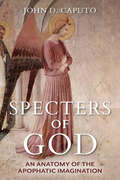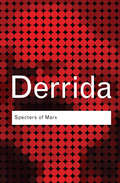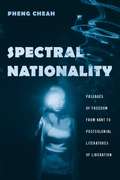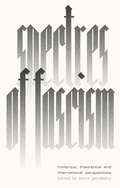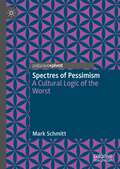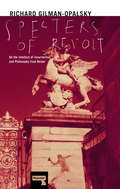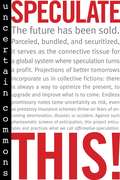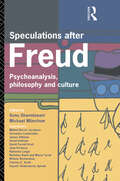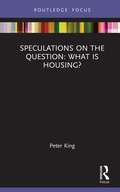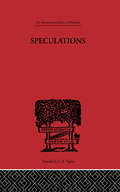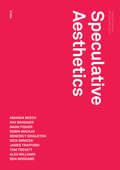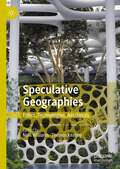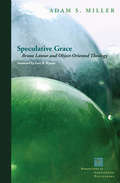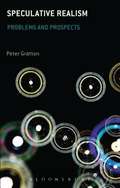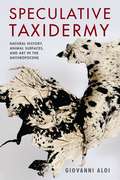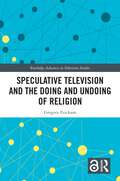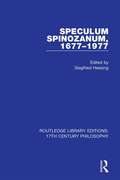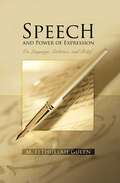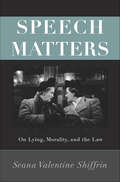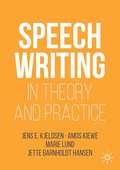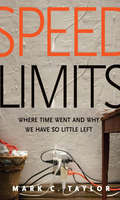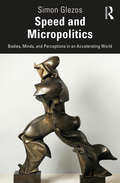- Table View
- List View
Specters of God: An Anatomy of the Apophatic Imagination
by John D. CaputoIn Specters of God, John D. Caputo returns to the original impulse of his work, the "mystical element" in things, here under the name of an "anxious apophatics," as distinct from an "edifying apophatics" anchored in unity with God. In dialogue with Schelling, a new turn for him and the lynchpin of this argument, Caputo addresses the nocturnal powers in being, the specters that haunt our being and bring us up short. The result is an erudite and insightful analysis—in his usual lively and masterful style—of several key "spectral" figures from medieval angelology and Eckhart's Gottheit, through Luther's deus absconditus and Schelling's "Satanology," to the spectralization and virtualization of the world in the "posthuman" age. Arguing that the name of God is not the master name of a super-being who is going to save us but a placeholder for sources deep in our apophatic imaginary, he asks, Has "God" become a (holy) ghost of the past? A passing spectral effect of the ancient harmonies of the spheres? Does radical thinking culminate in a cosmopoetics beyond theism and its theology, in a doxology to the transient glory of the world, whatever it was in the beginning, however eerie its end, world without why?
Specters of Marx: The State of the Debt, the Work of Mourning and the New International
by Jacques DerridaProdigiously influential, Jacques Derrida gave rise to a comprehensive rethinking of the basic concepts and categories of Western philosophy in the latter part of the twentieth century, with writings central to our understanding of language, meaning, identity, ethics and values. In 1993, a conference was organized around the question, 'Whither Marxism?’, and Derrida was invited to open the proceedings. His plenary address, 'Specters of Marx', delivered in two parts, forms the basis of this book. Hotly debated when it was first published, a rapidly changing world and world politics have scarcely dented the relevance of this book.
Spectral Nationality: Passages of Freedom from Kant to Postcolonial Literatures of Liberation
by Pheng CheahThis far-ranging and ambitious attempt to rethink postcolonial theory's discussion of the nation and nationalism brings the problems of the postcolonial condition to bear on the philosophy of freedom. Closely identified with totalitarianism and fundamentalism, the nation-state has a tainted history of coercion, ethnic violence, and even, as in ultranationalist Nazi Germany, genocide. Most contemporary theorists are therefore skeptical, if not altogether dismissive, of the idea of the nation and the related metaphor of the political body as an organism. Going against orthodoxy, Pheng Cheah retraces the universal-rationalist foundations and progressive origins of political organicism in the work of Kant and its development in philosophers in the German tradition such as Fichte, Hegel, and Marx. Cheah argues that the widespread association of freedom with the self-generating dynamism of life and culture's power of transcendence is the most important legacy of this tradition. Addressing this legacy's manifestations in Fanon and Cabral's theories of anticolonial struggle and contemporary anticolonial literature, including the Buru Quartet by Indonesian writer Pramoedya Ananta Toer, and the Kenyan writer Ngugi Wa Thiong'o's nationalist novels, Cheah suggests that the profound difficulties of achieving freedom in the postcolonial world indicate the need to reconceptualize freedom in terms of the figure of the specter rather than the living organism.
Spectres of Fascism: Historical, Theoretical, and International Perspectives
by Samir GandeshaConcerns over the rise of fascism have been preoccupied with the Trump presidency and the Brexit vote in the UK, yet, globally, we are witnessing a turn towards anti-democratic and illiberal forces. From the tragic denouement of the Egyptian Revolution to the consolidation of the so-called Gujarat Model in India under the leadership of Prime Minister Narendra Modi and the consolidation of the power of Turkish President Recep Tayyip Erdogan, to the recent election of Jair Bolsonaro in Brazil, fascist ideology, aesthetics, and personalities appear across the globe. Spectres of Fascism makes a significant contribution to the unfolding discussion on whether what we are witnessing today is best understood as a return to classic twentieth-century fascism or some species of what has been called “post-fascism.” Applying a uniquely global perspective, it combines analyses of historical contexts, theoretical approaches, and contemporary geopolitics.
Spectres of Pessimism: A Cultural Logic of the Worst
by Mark SchmittThis book argues that philosophical pessimism can offer vital impulses for contemporary cultural studies. Pessimist thought offers ways to interrogate notions of temporality, progress and futurity. When the horizon of future expectation is increasingly shaped by the prospect of apocalypse and extinction, an exploration of pessimist thought can help to make sense of an increasingly complex and uncertain world by affirming rather than suppressing the worst. This book argues that a cultural logic of the worst is at work in a substantial section of contemporary philosophical thought and cultural representations.Spectres of pessimism can be found in contemporary ecocritical thought, antinatalist philosophies, political thought, and cultural theory, as well as in literature, film, and popular music. In its unsettling of temporality, this new pessimism shares sensibilities with the field of hauntology. Both deconstruct linear narratives of time that adhere to a stable sequence of past, present and future. Mark Schmitt therefore couples pessimism and hauntology to explore the spectres of pessimism in a range of theories and narratives—from ecocriticism, antinatalism and queer theory to utopianism, from afropessimism to the fiction of Hari Kunzru and Thomas Ligotti to the films of Camille Griffin, Gaspar Noé, Denis Villeneuve and Lars von Trier.
Spectres of Revolt
by Richard Gilman-OpalskyIn 1848, Karl Marx declared that a communist specter was haunting Europe. In 1994, Jacques Derrida considered how the spectre of Marx would haunt the post-Cold War world. In Specters of Revolt, Gilman-Opalsky argues that the world is haunted by revolt, by the possibility of events that interrupt and disrupt the world, that throw its reality and justice into question. But recent revolt is neither decisively communist nor decisively Marxist. Gilman-Opalsky develops a theory of revolt that accounts for its diverse critical content about autonomy, everyday life, anxiety, experience, knowledge, and possibility. The 1994 uprising of the Mexican Zapatistas set the stage for new forms of revolt against a newly expanded power of capital. In the 20 years since, including the recent phase of global uprisings that began in 2008 with the Greek revolts, insurrection has spoken in the "Arab Spring" in Spain, Turkey, Brazil, and in the U.S. in Occupy Wall Street, Ferguson, and Baltimore, among other places. In light of recent global uprisings, Gilman-Opalsky aims to move beyond the critical theory of revolt to an understanding of revolt as theory itself. Making use of diverse sources from Raoul Vaneigem and Félix Guattari to Julia Kristeva and Raya Dunayevskaya, Spectres of Revolt explores upheaval as thinking, the intellect of insurrection, and philosophy from below.From the Trade Paperback edition.
Speculate This!
by Uncertain CommonsA short, timely manifesto critiquing predatory modes of financial speculation that seek to minimize uncertainty and risk, while advocating speculative practices that embrace uncertainty, spur radical change, and enable alternative futures.
Speculations After Freud: Psychoanalysis, Philosophy and Culture
by Sonu Shamdasani Michael MünchowPsychoanalysis has transformed our culture. We constantly use and refer to ideas from psychoanalysis, often unconsciously. Psychology, philosophy, politics, sociology, women's studies, anthropology, literary studies, cultural studies, and other disciplines have been permeated by the competing schools of psychoanalysis. But what of psychoanalysis itself? Where is it going one hundred years after Freud's own speculations took shape? Does it still have a role to play in cultural debate, or should it perhaps be abandoned? Speculations After Freud confronts the dilemmas of contemporary psychoanalysis by bringing together some of the most influential and best known writers on psychoanalysis, philosophy and culture. The advocates and critics of psychoanalysis, both institutional and theoretical, critically appraise the powerful role psychoanalytic speculation plays in all areas of culture.
Speculations on the Question: What Is Housing? (Routledge Focus on Housing and Philosophy)
by Peter KingThis book consists of a single essay that speculates on the question what is housing?, and its opposite question, what is not housing? The essay is organised around two distinct discourses around which housing can be framed. The first, which is the dominant discourse, is what I term policy thinking. This is where housing is seen solely in terms of policy formulation and action. The second discourse is private dwelling, which describes housing in terms of a private space used by households. Private dwelling might be seen as a product of policy, but, in actuality, it precedes policy thinking in being the very purpose of policy. Having made this distinction between policy thinking and private dwelling, and so stated in principle what housing is, the subsequent sections of the essay explore the nature of private dwelling in more detail and so substantiate the distinction between the two forms of discourse.
Speculations: Essays on Humanism and the Philosophy of Art (International Library of Philosophy)
by Herbert Read T E Hulme Jacob EpsteinFirst published in 2000. Routledge is an imprint of Taylor & Francis, an informa company.
Speculative Aesthetics (Urbanomic / Redactions #4)
by Robin MackayAn examination of the new technological mediations between the human sensorium and the planetary media network and of the aesthetic as an enabler of new modes of knowledge.This series of interventions on the ramifications of Speculative Realism for aesthetics ranges from contemporary art's relation to the aesthetic, to accelerationism and abstraction, logic and design.From varied perspectives of philosophy, art, and design, participants examine the new technological mediations between the human sensorium and the massive planetary media network within which it now exists and consider how the aesthetic enables new modes of knowledge by processing sensory data through symbolic formalisms and technological devices.Speculative Aesthetics anticipates the possibility of a theory and practice no longer invested in the otherworldly promise of the aesthetic, but acknowledging the real force and traction of images in the world today, experimentally employing techniques of modelling, formalisation, and presentation so as to simultaneously engineer new domains of experience and map them through a reconfigured aesthetics that is inseparable from its sociotechnical conditions.
Speculative Geographies: Ethics, Technologies, Aesthetics
by Thomas Keating Nina WilliamsThis book explores how speculative thinking is shaping how we relate to our entangled social, mental, and environmental ecologies. It examines how speculative philosophies and concepts are changing geographical research methods and techniques, whilst also developing how speculative thinking transforms the way human, non-human, and more-than-human things are conceptualised in research practices across the social sciences, arts, and humanities. Offering the first dedicated compendium of geographical engagements with speculation and speculative thinking, the chapters in this edited collection advance debates about how affective, imperceptible, and infra-sensible qualities of environments might be written about through alternative registers and ontologies of experience. Organised around the themes of Ethics, Technologies, and Aesthetics, the book will appeal to those engaging with architecture, Black political theory, fiction, cinema, children’s geographies, biotechnologies, philosophy, rural studies, arts practice, and nuclear waste studies as speculative research practices appropriate for addressing contemporary ecological problems.Chapters 1, 3 and 4 are available open access under a Creative Commons Attribution 4.0 International License via link.springer.com.
Speculative Grace: Bruno Latour and Object-Oriented Theology (Perspectives in Continental Philosophy)
by Adam S. MillerThis book offers a novel account of grace framed in terms of Bruno Latour’s “principle of irreduction.” It thus models an object-oriented approach to grace, experimentally moving a traditional Christian understanding of grace out of a top-down, theistic ontology and into an agent-based, object-oriented ontology. In the process, it also provides a systematic and original account of Latour’s overall project.The account of grace offered here redistributes the tasks assigned to science and religion. Where now the work of science is to bring into focus objects that are too distant, too resistant, and too transcendent to be visible, the business of religion is to bring into focus objects that are too near, too available, and too immanent to be visible. Where science reveals transcendent objects by correcting for our nearsightedness, religion reveals immanent objects by correcting for our farsightedness. Speculative Grace remaps the meaning of grace and examines the kinds of religious instruments and practices that, as a result, take center stage.
Speculative Realism: Problems And Prospects
by Michael Austin Peter GrattonSpeculative realism is one of the most talked-about movements in recent Continental philosophy. It has been discussed widely amongst the younger generation of Continental philosophers seeking new philosophical approaches and promises to form the cornerstone of future debates in the field. This book introduces the contexts out of which speculative realism has emerged and provides an overview of the major contributors and latest developments. It guides the reader through the important questions asked by realism (what can I know? what is reality?), examining philosophy's perennial questions in new ways. The book begins with the speculative realist's critique of 'correlationism', the view that we can never reach what is real beneath our language systems, our means for perception, or our finite manner of being-in-the-world. It goes on to critically review the work of the movement's most important thinkers, including Quentin Meillassoux, Ray Brassier, and Graham Harman, but also other important writers such as Jane Bennett and Catherine Malabou whose writings delineate alternative approaches to the real. It interrogates the crucial questions these thinkers have raised and concludes with a look toward the future of speculative realism, especially as it relates to the reality of time.
Speculative Taxidermy: Natural History, Animal Surfaces, and Art in the Anthropocene (Critical Life Studies)
by Giovanni AloiTaxidermy, once the province of natural history and dedicated to the pursuit of lifelike realism, has recently resurfaced in the world of contemporary art, culture, and interior design. In Speculative Taxidermy, Giovanni Aloi offers a comprehensive mapping of the discourses and practices that have enabled the emergence of taxidermy in contemporary art. Drawing on the speculative turn in philosophy and recovering past alternative histories of art and materiality from a biopolitical perspective, Aloi theorizes speculative taxidermy: a powerful interface that unlocks new ethical and political opportunities in human-animal relationships and speaks to how animal representation conveys the urgency of addressing climate change, capitalist exploitation, and mass extinction.A resolutely nonanthropocentric take on the materiality of one of the most controversial mediums in art, this approach relentlessly questions past and present ideas of human separation from the animal kingdom. It situates taxidermy as a powerful interface between humans and animals, rooted in a shared ontological and physical vulnerability. Carefully considering a select number of key examples including the work of Nandipha Mntambo, Maria Papadimitriou, Mark Dion, Berlinde De Bruyckere, Roni Horn, Oleg Kulik, Steve Bishop, Snæbjörnsdóttir/Wilson, and Cole Swanson, Speculative Taxidermy contextualizes the resilient presence of animal skin in the gallery space as a productive opportunity to rethink ethical and political stances in human-animal relationships.
Speculative Television and the Doing and Undoing of Religion (Routledge Advances in Television Studies)
by Gregory EricksonThis book explores the concept that, as participation in traditional religion declines, the complex and fantastical worlds of speculative television have become the place where theological questions and issues are negotiated, understood, and formed. From bodies, robots, and souls to purgatories and post-apocalyptic scenarios and new forms of digital scripture, the shows examined – from Buffy the Vampire Slayer to Westworld – invite their viewers and fans to engage with and imagine concepts traditionally reserved for religious spaces. Informed by recent trends in both fan studies and religious studies, and with an emphasis on practice as well as belief, the thematically focused narrative posits that it is through the intersections of these shows that we find the reframing and rethinking of religious ideas. This truly interdisciplinary work will resonate with scholars and upper-level students in the areas of religion, television studies, popular culture, fan studies, media studies, and philosophy.
Speculative Television and the Doing and Undoing of Religion (Routledge Advances in Television Studies)
by Gregory EricksonThis book explores the concept that, as participation in traditional religion declines, the complex and fantastical worlds of speculative television have become the place where theological questions and issues are negotiated, understood, and formed.From bodies, robots, and souls to purgatories and post-apocalyptic scenarios and new forms of digital scripture, the shows examined – from Buffy the Vampire Slayer to Westworld – invite their viewers and fans to engage with and imagine concepts traditionally reserved for religious spaces. Informed by recent trends in both fan studies and religious studies, and with an emphasis on practice as well as belief, the thematically focused narrative posits that it is through the intersections of these shows that we find the reframing and rethinking of religious ideas.This truly interdisciplinary work will resonate with scholars and upper-level students in the areas of religion, television studies, popular culture, fan studies, media studies, and philosophy.The Open Access version of this book, available at http://www.taylorfrancis.com, has been made available under a Creative Commons [Attribution-Non Commercial-No Derivatives (CC-BY-NC-ND)] 4.0 license.
Speculum Spinozanum, 1677-1977 (Routledge Library Editions: 17th Century Philosophy)
by Siegfried HessingOriginally published in 1978. These essays are written by distinguished philosophers from many countries and were published as a homage to Spinoza in the year which marked the three-hundredth anniversary of his death. A special feature of the book is that it includes a recently discovered letter by Spinoza, reproduced for the first time in English and in facsimile, with a commentary. The controversial influence of Spinoza on Freud is discussed, and illustrated by facsimile reproductions of original letters, hitherto unknown to Freudians and Spinozists alike. These letters direct revealing light on some of Freud’s attitudes. Important parallels between East and West will also attract the student of Spinoza.
Speech And Power Of Expression
by M. Fethullah GülenEmphasizing the esthetic concerns of the Islamic civilization as well as underlining the true nature of the religion, this insightful opus contains a collection of essays on the art of language from a revered contemporary scholar of Islam. Written separately as lead articles for the Turkish literary magazine, Yagmur, the volume eloquently articulates the author&’s approach to speech as well as his definitions of poetry, history, and beauty, all of which are deeply embroidered around the lacework of Islam. With powerful emphasis on belief in God, each essay addresses an important matter of language that aptly relates to the current state of affairs in the Muslim world and the nature of human existence in the 21st century as a whole.
Speech Begins after Death
by Michel FoucaultIn 1968, Michel Foucault agreed to a series of interviews with critic Claude Bonnefoy, which were to be published in book form. Bonnefoy wanted a dialogue with Foucault about his relationship to writing rather than about the content of his books. The project was abandoned, but a transcript of the initial interview survived and is now being published for the first time in English. In this brief and lively exchange, Foucault reflects on how he approached the written word throughout his life, from his school days to his discovery of the pleasure of writing.Wide ranging, characteristically insightful, and unexpectedly autobiographical, the discussion is revelatory of Foucault&’s intellectual development, his aims as a writer, his clinical methodology (&“let&’s say I&’m a diagnostician&”), and his interest in other authors, including Raymond Roussel and Antonin Artaud. Foucault discloses, in ways he never had previously, details about his home life, his family history, and the profound sense of obligation he feels to the act of writing. In his Introduction, Philippe Artières investigates Foucault&’s engagement in various forms of oral discourse—lectures, speeches, debates, press conferences, and interviews—and their place in his work.Speech Begins after Death shows Foucault adopting a new language, an innovative autobiographical communication that is neither conversation nor monologue, and is one of his most personal statements about his life and writing.
Speech Matters: On Lying, Morality, and the Law (Carl G. Hempel Lecture Series #4)
by Seana Valentine ShiffrinTo understand one another as individuals and to fulfill the moral duties that require such understanding, we must communicate with each other. We must also maintain protected channels that render reliable communication possible, a demand that, Seana Shiffrin argues, yields a prohibition against lying and requires protection for free speech. This book makes a distinctive philosophical argument for the wrong of the lie and provides an original account of its difference from the wrong of deception.Drawing on legal as well as philosophical arguments, the book defends a series of notable claims—that you may not lie about everything to the "murderer at the door," that you have reasons to keep promises offered under duress, that lies are not protected by free speech, that police subvert their mission when they lie to suspects, and that scholars undermine their goals when they lie to research subjects.Many philosophers start to craft moral exceptions to demands for sincerity and fidelity when they confront wrongdoers, the pressures of non-ideal circumstances, or the achievement of morally substantial ends. But Shiffrin consistently resists this sort of exceptionalism, arguing that maintaining a strong basis for trust and reliable communication through practices of sincerity, fidelity, and respecting free speech is an essential aspect of ensuring the conditions for moral progress, including our rehabilitation of and moral reconciliation with wrongdoers.
Speechwriting in Theory and Practice (Rhetoric, Politics and Society)
by Jens E. Kjeldsen Amos Kiewe Marie Lund Jette Barnholdt Hansen (Deceased)This book provides students, researchers, and practitioners of speechwriting with a unique insight in the theory, history, and practice of speechwriting. The combination of theory and practice with case studies from the United States and Europe makes this volume the first of its kind. The book offers an overview of the existing research and theory, analysing how speeches are written in political and public life, and paying attention to three central subjects of contemporary speechwriting: convincing characterization of the speaker, writing for the ear, and appealing with words to the eye. Chapters address the ethics and the functions of speechwriting in contemporary society and also deliver general instructions for the speechwriting process. This book is recommended reading for professional speechwriters wishing to expand their knowledge of the rhetorical and theoretical underpinnings of speechwriting, and enables students and aspiring speechwriters to gain an understanding of speechwriting as a profession.
Speechwriting in Theory and Practice (Rhetoric, Politics and Society)
by Jens E. Kjeldsen Amos Kiewe Marie Lund Jette Barnholdt HansenThis book provides students, researchers, and practitioners of speechwriting with a unique insight in the theory, history, and practice of speechwriting. The combination of theory and practice with case studies from the United States and Europe makes this volume the first of its kind. The book offers an overview of the existing research and theory, analysing how speeches are written in political and public life, and paying attention to three central subjects of contemporary speechwriting: convincing characterization of the speaker, writing for the ear, and appealing with words to the eye. Chapters address the ethics and the functions of speechwriting in contemporary society and also deliver general instructions for the speechwriting process. This book is recommended reading for professional speechwriters wishing to expand their knowledge of the rhetorical and theoretical underpinnings of speechwriting, and enables students and aspiring speechwriters to gain an understanding of speechwriting as a profession.
Speed Limits: Where Time Went and Why We Have So Little Left
by Mark C. TaylorA contemplation on &“the durability of our fast-tracked, multitasked modern world . . . a stimulating cautionary report for the digital age.&”—Kirkus Reviews We live in an ever-accelerating world: faster computers, markets, food, fashion, product cycles, minds, bodies, kids, lives. When did everything start moving so fast? Why does speed seem so inevitable? Is faster always better? Drawing together developments in religion, philosophy, art, technology, fashion, and finance, Mark C. Taylor presents an original and rich account of a great paradox of our times: how the very forces and technologies that were supposed to free us by saving time and labor now trap us in a race we can never win. The faster we go, the less time we have, and the more we try to catch up, the farther behind we fall. Connecting our speed-obsession with today&’s global capitalism, he composes a grand narrative showing how commitments to economic growth and extreme competition, combined with accelerating technological innovation, have brought us close to disaster. Psychologically, environmentally, economically, and culturally, speed is taking a profound toll on our lives. By showing how the phenomenon of speed has emerged, Taylor offers us a chance to see our pace of life as the product of specific ideas, practices, and policies. It&’s not inevitable or irreversible. He courageously and movingly invites us to imagine how we might patiently work towards a more deliberative life and sustainable world. &“With panache and flashes of brilliance, Taylor, a Columbia University religion professor and cultural critic, offers a philosophically astute analysis of how time works in our era.&” —Publishers Weekly
Speed and Micropolitics: Bodies, Minds, and Perceptions in an Accelerating World
by Simon GlezosThis book provides a theoretical framework for understanding the micropolitics of speed; a rich, nuanced, and embodied account of life in an accelerating world. What does it feel like to live in an era of profound social acceleration? What kinds of affects, perceptions, and identities does an accelerating world produce? The answers to these questions mean more than simply understanding the psychology of speed; they also mean understanding issues in contemporary politics as diverse as xenophobia and anti-immigration policies, patterns of transnational identification and solidarity, social isolation and alienation, and the ability of new media to coordinate social movements. While drawing extensively on the work of contemporary theorists, Simon Glezos recognizes that social acceleration is not a purely recent phenomenon. He therefore turns to thinkers such as Nietzsche, Spinoza, Bergson, and Merleau-Ponty, to ask how they sought to understand, and respond to, the rapid changes and unsettling temporalities of their eras, and how their insights can be applied to our own. Advancing theoretical understanding and offering a useful way to analytically conceptualize the nature of time, Speed and Micropolitics will be of interest to students and scholars studying affect theory, theories of the body, new materialism, phenomenology, as well as the history of political thought.
